HNC Business Law - Legal System and Business Impact Report
VerifiedAdded on 2023/01/11
|8
|2136
|83
Report
AI Summary
This report provides a comprehensive overview of business law, focusing on the UK legal system and its implications for businesses. It begins by defining the sources of law, including domestic legislation, the European Convention on Human Rights, European Union law, and common law. The report then examines the role of the UK government in law-making and the application of both common and statutory laws. A significant portion of the report is dedicated to analyzing the impact of contract, company, and employment laws on business organizations, highlighting how these laws affect daily operations, employee rights, and contractual agreements. Furthermore, the report explores various legal solutions for resolving business disputes, such as mediation, arbitration, and litigation, using a case study to illustrate these methods. The report concludes by emphasizing the importance of adhering to legal regulations for sustainable business growth and the availability of funding sources for business operations. The assignment follows the guidelines of the Higher National Certificate/Diploma in Business, focusing on the legal system and its impact on businesses.
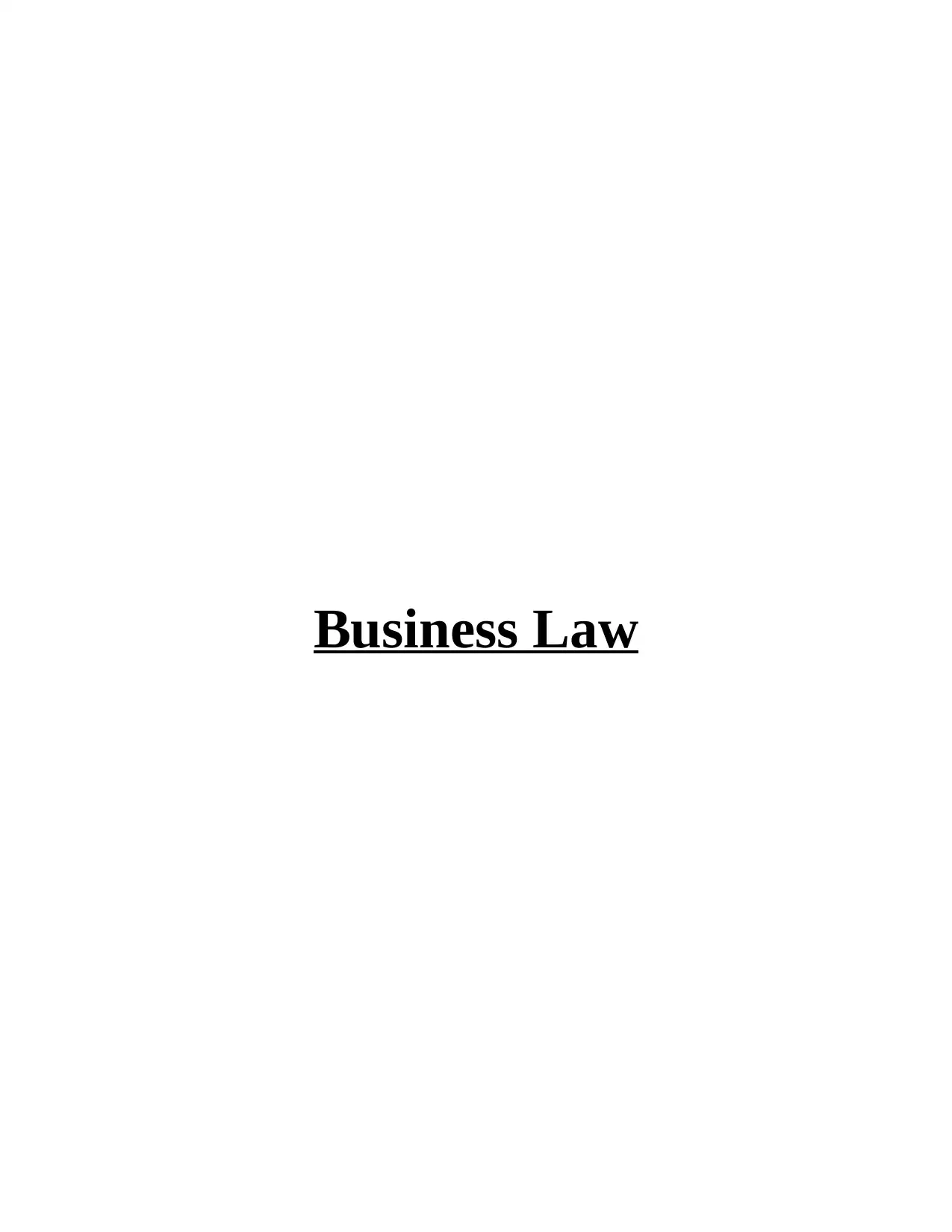
Business Law
Paraphrase This Document
Need a fresh take? Get an instant paraphrase of this document with our AI Paraphraser
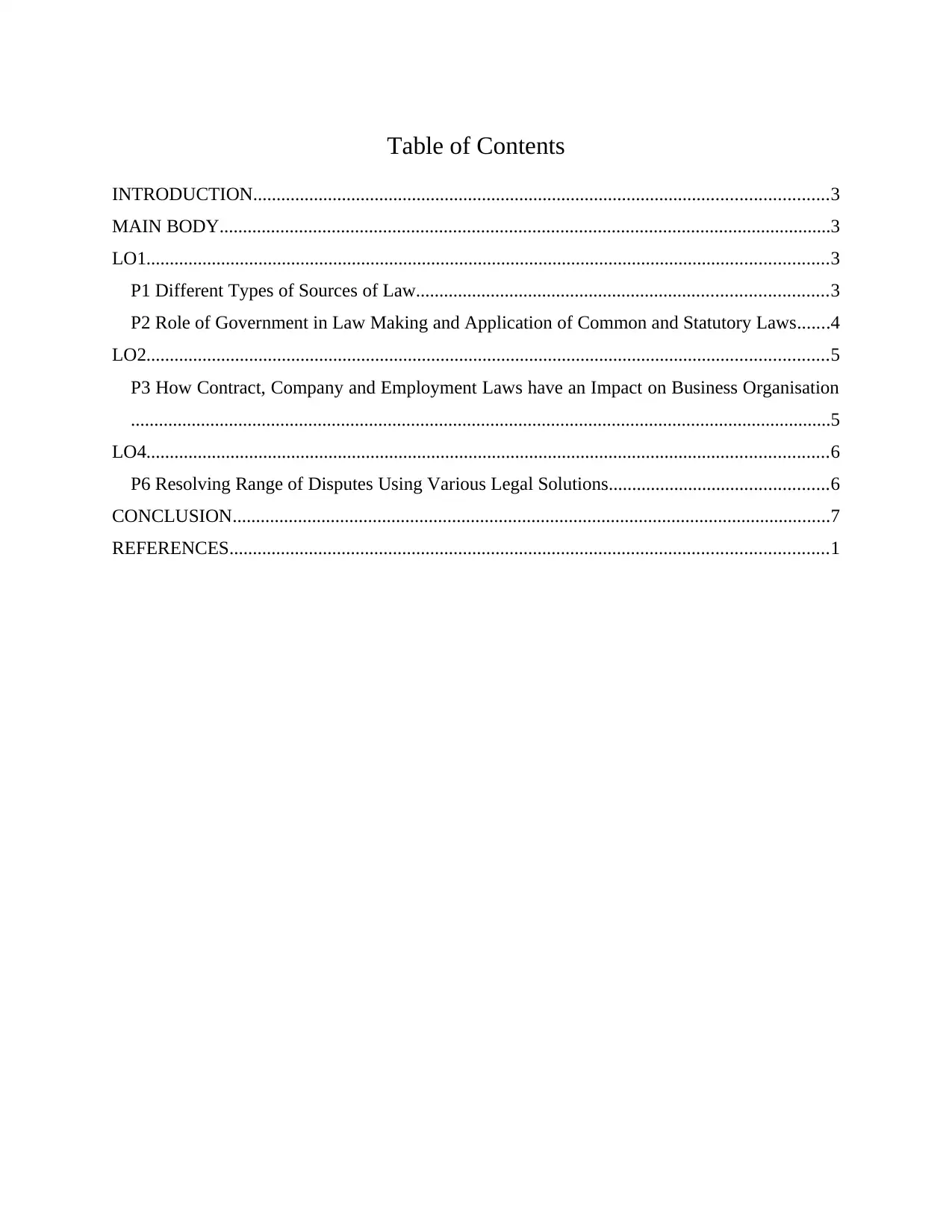
Table of Contents
INTRODUCTION...........................................................................................................................3
MAIN BODY...................................................................................................................................3
LO1..................................................................................................................................................3
P1 Different Types of Sources of Law........................................................................................3
P2 Role of Government in Law Making and Application of Common and Statutory Laws.......4
LO2..................................................................................................................................................5
P3 How Contract, Company and Employment Laws have an Impact on Business Organisation
......................................................................................................................................................5
LO4..................................................................................................................................................6
P6 Resolving Range of Disputes Using Various Legal Solutions...............................................6
CONCLUSION................................................................................................................................7
REFERENCES................................................................................................................................1
INTRODUCTION...........................................................................................................................3
MAIN BODY...................................................................................................................................3
LO1..................................................................................................................................................3
P1 Different Types of Sources of Law........................................................................................3
P2 Role of Government in Law Making and Application of Common and Statutory Laws.......4
LO2..................................................................................................................................................5
P3 How Contract, Company and Employment Laws have an Impact on Business Organisation
......................................................................................................................................................5
LO4..................................................................................................................................................6
P6 Resolving Range of Disputes Using Various Legal Solutions...............................................6
CONCLUSION................................................................................................................................7
REFERENCES................................................................................................................................1
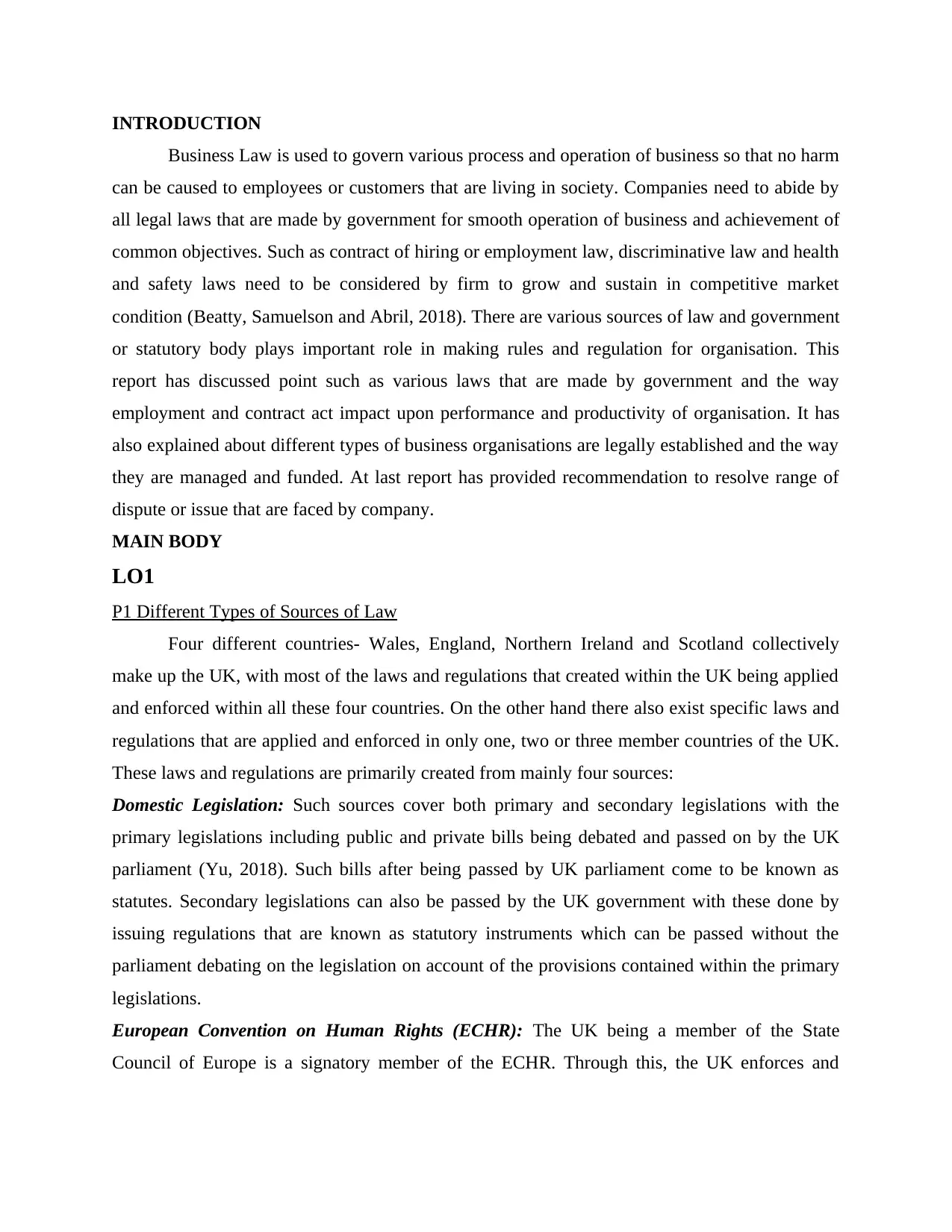
INTRODUCTION
Business Law is used to govern various process and operation of business so that no harm
can be caused to employees or customers that are living in society. Companies need to abide by
all legal laws that are made by government for smooth operation of business and achievement of
common objectives. Such as contract of hiring or employment law, discriminative law and health
and safety laws need to be considered by firm to grow and sustain in competitive market
condition (Beatty, Samuelson and Abril, 2018). There are various sources of law and government
or statutory body plays important role in making rules and regulation for organisation. This
report has discussed point such as various laws that are made by government and the way
employment and contract act impact upon performance and productivity of organisation. It has
also explained about different types of business organisations are legally established and the way
they are managed and funded. At last report has provided recommendation to resolve range of
dispute or issue that are faced by company.
MAIN BODY
LO1
P1 Different Types of Sources of Law
Four different countries- Wales, England, Northern Ireland and Scotland collectively
make up the UK, with most of the laws and regulations that created within the UK being applied
and enforced within all these four countries. On the other hand there also exist specific laws and
regulations that are applied and enforced in only one, two or three member countries of the UK.
These laws and regulations are primarily created from mainly four sources:
Domestic Legislation: Such sources cover both primary and secondary legislations with the
primary legislations including public and private bills being debated and passed on by the UK
parliament (Yu, 2018). Such bills after being passed by UK parliament come to be known as
statutes. Secondary legislations can also be passed by the UK government with these done by
issuing regulations that are known as statutory instruments which can be passed without the
parliament debating on the legislation on account of the provisions contained within the primary
legislations.
European Convention on Human Rights (ECHR): The UK being a member of the State
Council of Europe is a signatory member of the ECHR. Through this, the UK enforces and
Business Law is used to govern various process and operation of business so that no harm
can be caused to employees or customers that are living in society. Companies need to abide by
all legal laws that are made by government for smooth operation of business and achievement of
common objectives. Such as contract of hiring or employment law, discriminative law and health
and safety laws need to be considered by firm to grow and sustain in competitive market
condition (Beatty, Samuelson and Abril, 2018). There are various sources of law and government
or statutory body plays important role in making rules and regulation for organisation. This
report has discussed point such as various laws that are made by government and the way
employment and contract act impact upon performance and productivity of organisation. It has
also explained about different types of business organisations are legally established and the way
they are managed and funded. At last report has provided recommendation to resolve range of
dispute or issue that are faced by company.
MAIN BODY
LO1
P1 Different Types of Sources of Law
Four different countries- Wales, England, Northern Ireland and Scotland collectively
make up the UK, with most of the laws and regulations that created within the UK being applied
and enforced within all these four countries. On the other hand there also exist specific laws and
regulations that are applied and enforced in only one, two or three member countries of the UK.
These laws and regulations are primarily created from mainly four sources:
Domestic Legislation: Such sources cover both primary and secondary legislations with the
primary legislations including public and private bills being debated and passed on by the UK
parliament (Yu, 2018). Such bills after being passed by UK parliament come to be known as
statutes. Secondary legislations can also be passed by the UK government with these done by
issuing regulations that are known as statutory instruments which can be passed without the
parliament debating on the legislation on account of the provisions contained within the primary
legislations.
European Convention on Human Rights (ECHR): The UK being a member of the State
Council of Europe is a signatory member of the ECHR. Through this, the UK enforces and
⊘ This is a preview!⊘
Do you want full access?
Subscribe today to unlock all pages.

Trusted by 1+ million students worldwide
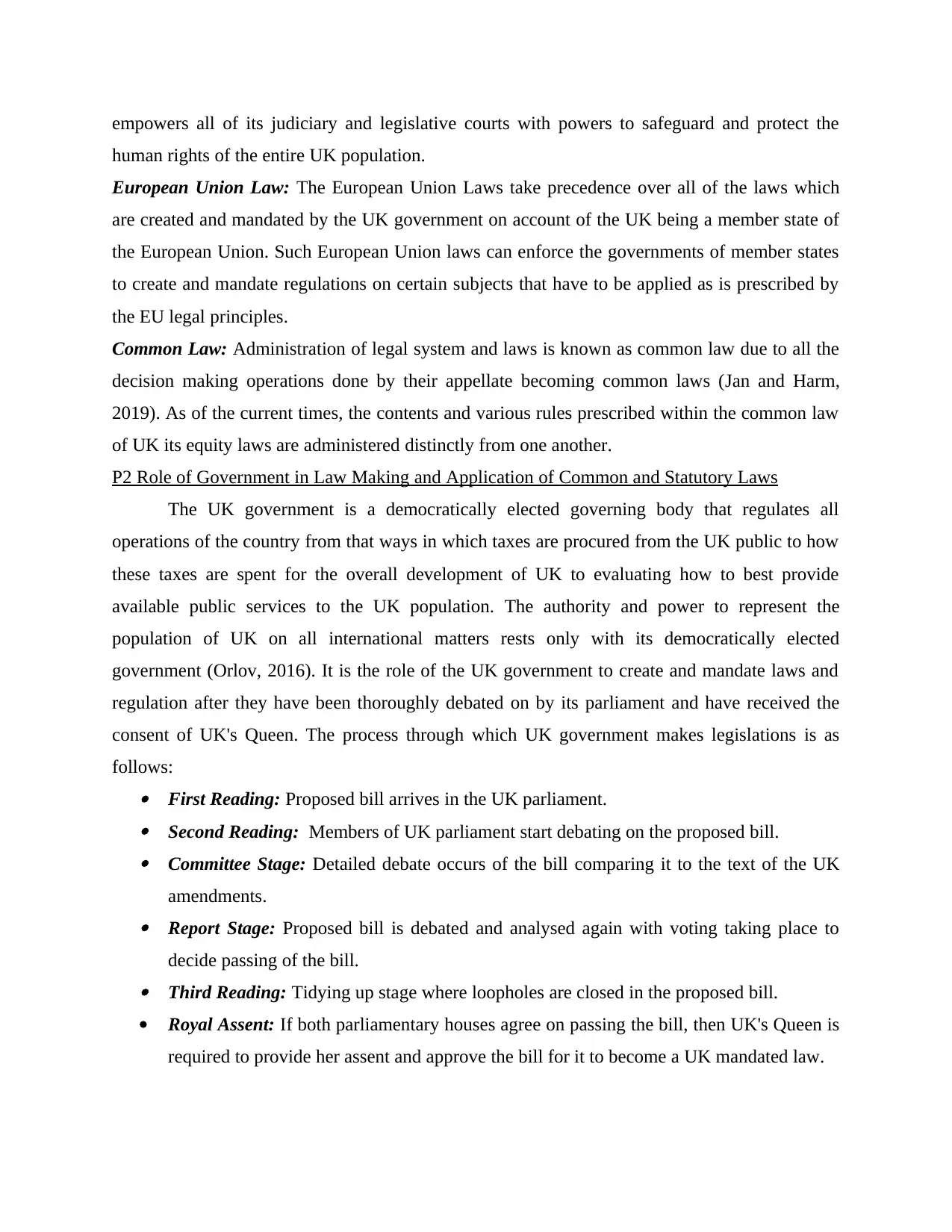
empowers all of its judiciary and legislative courts with powers to safeguard and protect the
human rights of the entire UK population.
European Union Law: The European Union Laws take precedence over all of the laws which
are created and mandated by the UK government on account of the UK being a member state of
the European Union. Such European Union laws can enforce the governments of member states
to create and mandate regulations on certain subjects that have to be applied as is prescribed by
the EU legal principles.
Common Law: Administration of legal system and laws is known as common law due to all the
decision making operations done by their appellate becoming common laws (Jan and Harm,
2019). As of the current times, the contents and various rules prescribed within the common law
of UK its equity laws are administered distinctly from one another.
P2 Role of Government in Law Making and Application of Common and Statutory Laws
The UK government is a democratically elected governing body that regulates all
operations of the country from that ways in which taxes are procured from the UK public to how
these taxes are spent for the overall development of UK to evaluating how to best provide
available public services to the UK population. The authority and power to represent the
population of UK on all international matters rests only with its democratically elected
government (Orlov, 2016). It is the role of the UK government to create and mandate laws and
regulation after they have been thoroughly debated on by its parliament and have received the
consent of UK's Queen. The process through which UK government makes legislations is as
follows: First Reading: Proposed bill arrives in the UK parliament. Second Reading: Members of UK parliament start debating on the proposed bill. Committee Stage: Detailed debate occurs of the bill comparing it to the text of the UK
amendments. Report Stage: Proposed bill is debated and analysed again with voting taking place to
decide passing of the bill. Third Reading: Tidying up stage where loopholes are closed in the proposed bill.
Royal Assent: If both parliamentary houses agree on passing the bill, then UK's Queen is
required to provide her assent and approve the bill for it to become a UK mandated law.
human rights of the entire UK population.
European Union Law: The European Union Laws take precedence over all of the laws which
are created and mandated by the UK government on account of the UK being a member state of
the European Union. Such European Union laws can enforce the governments of member states
to create and mandate regulations on certain subjects that have to be applied as is prescribed by
the EU legal principles.
Common Law: Administration of legal system and laws is known as common law due to all the
decision making operations done by their appellate becoming common laws (Jan and Harm,
2019). As of the current times, the contents and various rules prescribed within the common law
of UK its equity laws are administered distinctly from one another.
P2 Role of Government in Law Making and Application of Common and Statutory Laws
The UK government is a democratically elected governing body that regulates all
operations of the country from that ways in which taxes are procured from the UK public to how
these taxes are spent for the overall development of UK to evaluating how to best provide
available public services to the UK population. The authority and power to represent the
population of UK on all international matters rests only with its democratically elected
government (Orlov, 2016). It is the role of the UK government to create and mandate laws and
regulation after they have been thoroughly debated on by its parliament and have received the
consent of UK's Queen. The process through which UK government makes legislations is as
follows: First Reading: Proposed bill arrives in the UK parliament. Second Reading: Members of UK parliament start debating on the proposed bill. Committee Stage: Detailed debate occurs of the bill comparing it to the text of the UK
amendments. Report Stage: Proposed bill is debated and analysed again with voting taking place to
decide passing of the bill. Third Reading: Tidying up stage where loopholes are closed in the proposed bill.
Royal Assent: If both parliamentary houses agree on passing the bill, then UK's Queen is
required to provide her assent and approve the bill for it to become a UK mandated law.
Paraphrase This Document
Need a fresh take? Get an instant paraphrase of this document with our AI Paraphraser
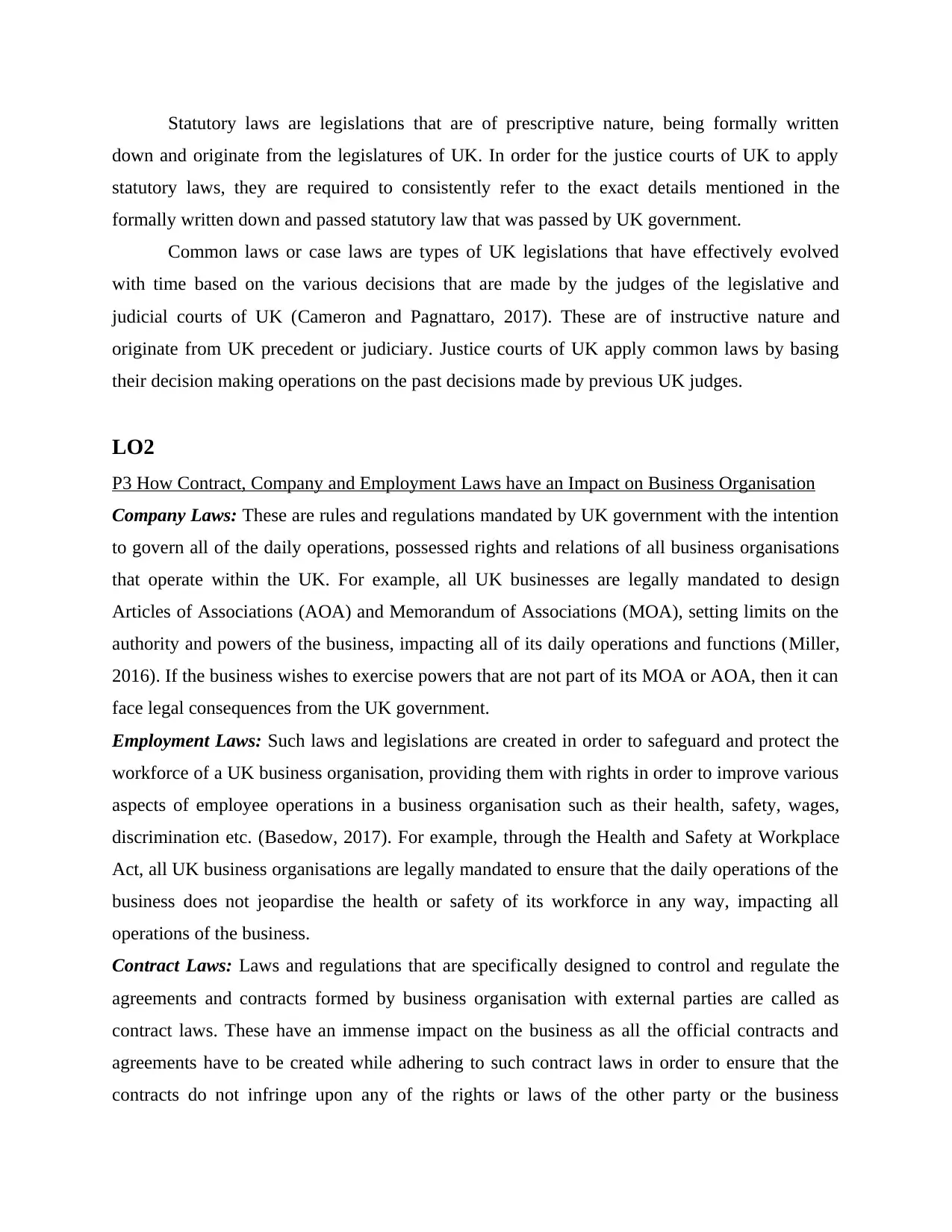
Statutory laws are legislations that are of prescriptive nature, being formally written
down and originate from the legislatures of UK. In order for the justice courts of UK to apply
statutory laws, they are required to consistently refer to the exact details mentioned in the
formally written down and passed statutory law that was passed by UK government.
Common laws or case laws are types of UK legislations that have effectively evolved
with time based on the various decisions that are made by the judges of the legislative and
judicial courts of UK (Cameron and Pagnattaro, 2017). These are of instructive nature and
originate from UK precedent or judiciary. Justice courts of UK apply common laws by basing
their decision making operations on the past decisions made by previous UK judges.
LO2
P3 How Contract, Company and Employment Laws have an Impact on Business Organisation
Company Laws: These are rules and regulations mandated by UK government with the intention
to govern all of the daily operations, possessed rights and relations of all business organisations
that operate within the UK. For example, all UK businesses are legally mandated to design
Articles of Associations (AOA) and Memorandum of Associations (MOA), setting limits on the
authority and powers of the business, impacting all of its daily operations and functions (Miller,
2016). If the business wishes to exercise powers that are not part of its MOA or AOA, then it can
face legal consequences from the UK government.
Employment Laws: Such laws and legislations are created in order to safeguard and protect the
workforce of a UK business organisation, providing them with rights in order to improve various
aspects of employee operations in a business organisation such as their health, safety, wages,
discrimination etc. (Basedow, 2017). For example, through the Health and Safety at Workplace
Act, all UK business organisations are legally mandated to ensure that the daily operations of the
business does not jeopardise the health or safety of its workforce in any way, impacting all
operations of the business.
Contract Laws: Laws and regulations that are specifically designed to control and regulate the
agreements and contracts formed by business organisation with external parties are called as
contract laws. These have an immense impact on the business as all the official contracts and
agreements have to be created while adhering to such contract laws in order to ensure that the
contracts do not infringe upon any of the rights or laws of the other party or the business
down and originate from the legislatures of UK. In order for the justice courts of UK to apply
statutory laws, they are required to consistently refer to the exact details mentioned in the
formally written down and passed statutory law that was passed by UK government.
Common laws or case laws are types of UK legislations that have effectively evolved
with time based on the various decisions that are made by the judges of the legislative and
judicial courts of UK (Cameron and Pagnattaro, 2017). These are of instructive nature and
originate from UK precedent or judiciary. Justice courts of UK apply common laws by basing
their decision making operations on the past decisions made by previous UK judges.
LO2
P3 How Contract, Company and Employment Laws have an Impact on Business Organisation
Company Laws: These are rules and regulations mandated by UK government with the intention
to govern all of the daily operations, possessed rights and relations of all business organisations
that operate within the UK. For example, all UK businesses are legally mandated to design
Articles of Associations (AOA) and Memorandum of Associations (MOA), setting limits on the
authority and powers of the business, impacting all of its daily operations and functions (Miller,
2016). If the business wishes to exercise powers that are not part of its MOA or AOA, then it can
face legal consequences from the UK government.
Employment Laws: Such laws and legislations are created in order to safeguard and protect the
workforce of a UK business organisation, providing them with rights in order to improve various
aspects of employee operations in a business organisation such as their health, safety, wages,
discrimination etc. (Basedow, 2017). For example, through the Health and Safety at Workplace
Act, all UK business organisations are legally mandated to ensure that the daily operations of the
business does not jeopardise the health or safety of its workforce in any way, impacting all
operations of the business.
Contract Laws: Laws and regulations that are specifically designed to control and regulate the
agreements and contracts formed by business organisation with external parties are called as
contract laws. These have an immense impact on the business as all the official contracts and
agreements have to be created while adhering to such contract laws in order to ensure that the
contracts do not infringe upon any of the rights or laws of the other party or the business
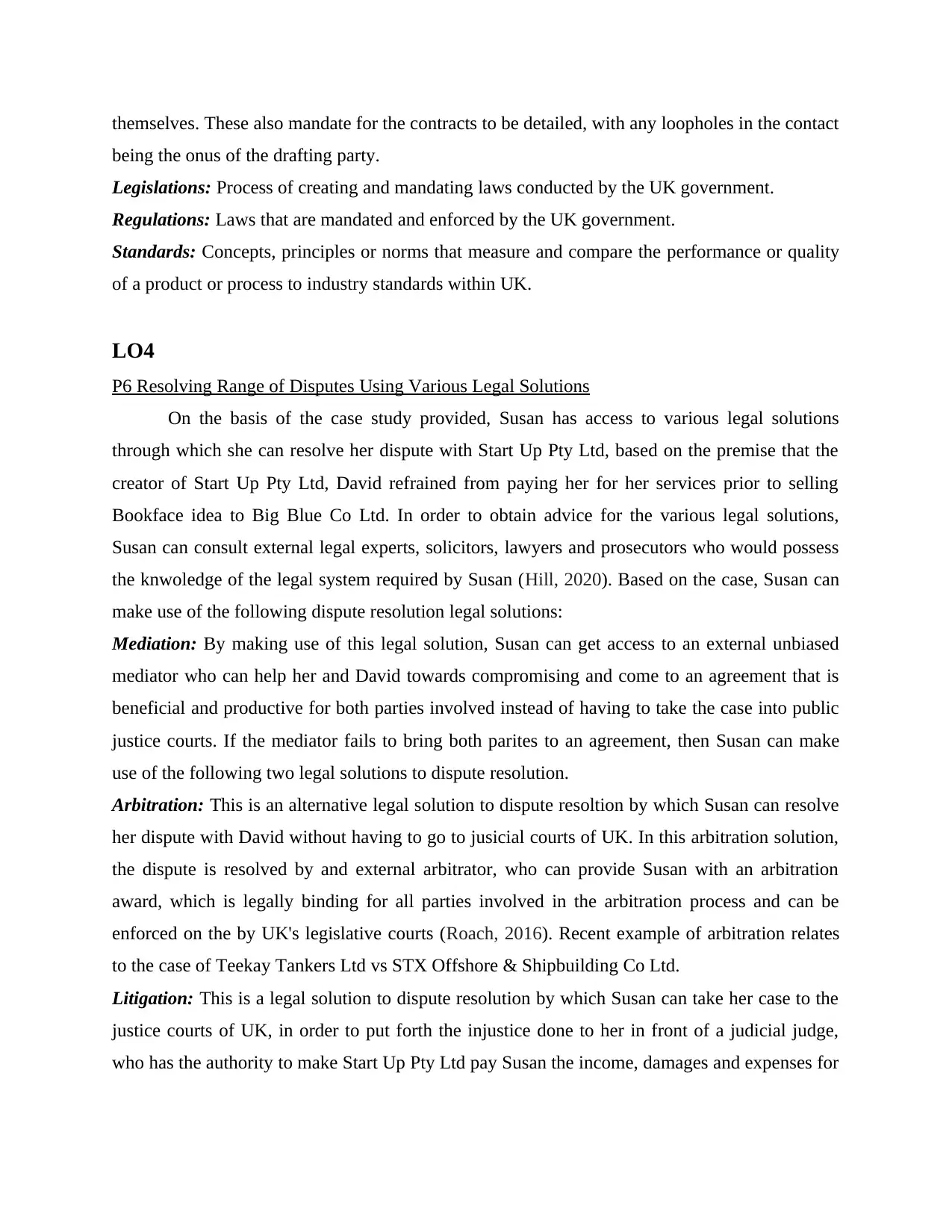
themselves. These also mandate for the contracts to be detailed, with any loopholes in the contact
being the onus of the drafting party.
Legislations: Process of creating and mandating laws conducted by the UK government.
Regulations: Laws that are mandated and enforced by the UK government.
Standards: Concepts, principles or norms that measure and compare the performance or quality
of a product or process to industry standards within UK.
LO4
P6 Resolving Range of Disputes Using Various Legal Solutions
On the basis of the case study provided, Susan has access to various legal solutions
through which she can resolve her dispute with Start Up Pty Ltd, based on the premise that the
creator of Start Up Pty Ltd, David refrained from paying her for her services prior to selling
Bookface idea to Big Blue Co Ltd. In order to obtain advice for the various legal solutions,
Susan can consult external legal experts, solicitors, lawyers and prosecutors who would possess
the knwoledge of the legal system required by Susan (Hill, 2020). Based on the case, Susan can
make use of the following dispute resolution legal solutions:
Mediation: By making use of this legal solution, Susan can get access to an external unbiased
mediator who can help her and David towards compromising and come to an agreement that is
beneficial and productive for both parties involved instead of having to take the case into public
justice courts. If the mediator fails to bring both parites to an agreement, then Susan can make
use of the following two legal solutions to dispute resolution.
Arbitration: This is an alternative legal solution to dispute resoltion by which Susan can resolve
her dispute with David without having to go to jusicial courts of UK. In this arbitration solution,
the dispute is resolved by and external arbitrator, who can provide Susan with an arbitration
award, which is legally binding for all parties involved in the arbitration process and can be
enforced on the by UK's legislative courts (Roach, 2016). Recent example of arbitration relates
to the case of Teekay Tankers Ltd vs STX Offshore & Shipbuilding Co Ltd.
Litigation: This is a legal solution to dispute resolution by which Susan can take her case to the
justice courts of UK, in order to put forth the injustice done to her in front of a judicial judge,
who has the authority to make Start Up Pty Ltd pay Susan the income, damages and expenses for
being the onus of the drafting party.
Legislations: Process of creating and mandating laws conducted by the UK government.
Regulations: Laws that are mandated and enforced by the UK government.
Standards: Concepts, principles or norms that measure and compare the performance or quality
of a product or process to industry standards within UK.
LO4
P6 Resolving Range of Disputes Using Various Legal Solutions
On the basis of the case study provided, Susan has access to various legal solutions
through which she can resolve her dispute with Start Up Pty Ltd, based on the premise that the
creator of Start Up Pty Ltd, David refrained from paying her for her services prior to selling
Bookface idea to Big Blue Co Ltd. In order to obtain advice for the various legal solutions,
Susan can consult external legal experts, solicitors, lawyers and prosecutors who would possess
the knwoledge of the legal system required by Susan (Hill, 2020). Based on the case, Susan can
make use of the following dispute resolution legal solutions:
Mediation: By making use of this legal solution, Susan can get access to an external unbiased
mediator who can help her and David towards compromising and come to an agreement that is
beneficial and productive for both parties involved instead of having to take the case into public
justice courts. If the mediator fails to bring both parites to an agreement, then Susan can make
use of the following two legal solutions to dispute resolution.
Arbitration: This is an alternative legal solution to dispute resoltion by which Susan can resolve
her dispute with David without having to go to jusicial courts of UK. In this arbitration solution,
the dispute is resolved by and external arbitrator, who can provide Susan with an arbitration
award, which is legally binding for all parties involved in the arbitration process and can be
enforced on the by UK's legislative courts (Roach, 2016). Recent example of arbitration relates
to the case of Teekay Tankers Ltd vs STX Offshore & Shipbuilding Co Ltd.
Litigation: This is a legal solution to dispute resolution by which Susan can take her case to the
justice courts of UK, in order to put forth the injustice done to her in front of a judicial judge,
who has the authority to make Start Up Pty Ltd pay Susan the income, damages and expenses for
⊘ This is a preview!⊘
Do you want full access?
Subscribe today to unlock all pages.

Trusted by 1+ million students worldwide
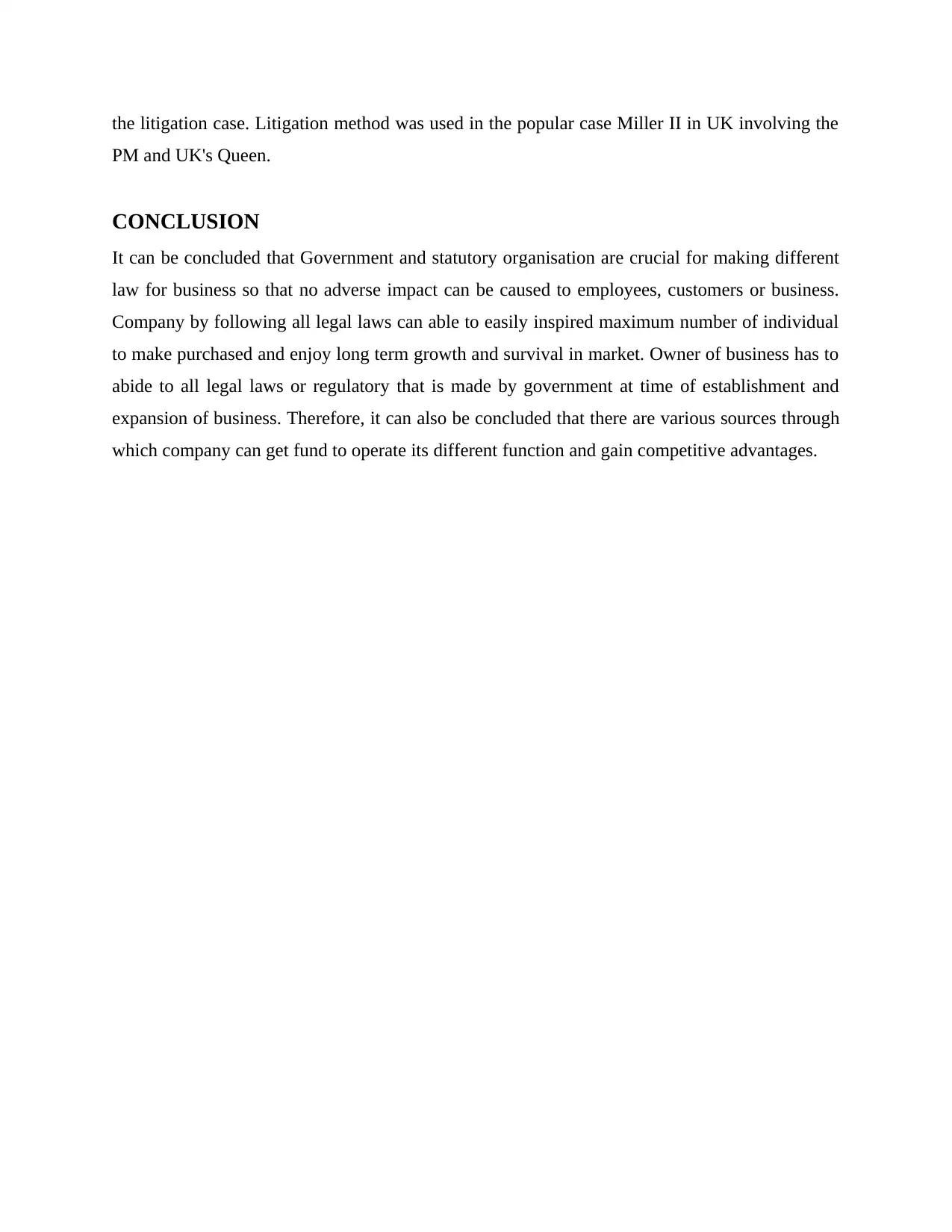
the litigation case. Litigation method was used in the popular case Miller II in UK involving the
PM and UK's Queen.
CONCLUSION
It can be concluded that Government and statutory organisation are crucial for making different
law for business so that no adverse impact can be caused to employees, customers or business.
Company by following all legal laws can able to easily inspired maximum number of individual
to make purchased and enjoy long term growth and survival in market. Owner of business has to
abide to all legal laws or regulatory that is made by government at time of establishment and
expansion of business. Therefore, it can also be concluded that there are various sources through
which company can get fund to operate its different function and gain competitive advantages.
PM and UK's Queen.
CONCLUSION
It can be concluded that Government and statutory organisation are crucial for making different
law for business so that no adverse impact can be caused to employees, customers or business.
Company by following all legal laws can able to easily inspired maximum number of individual
to make purchased and enjoy long term growth and survival in market. Owner of business has to
abide to all legal laws or regulatory that is made by government at time of establishment and
expansion of business. Therefore, it can also be concluded that there are various sources through
which company can get fund to operate its different function and gain competitive advantages.
Paraphrase This Document
Need a fresh take? Get an instant paraphrase of this document with our AI Paraphraser
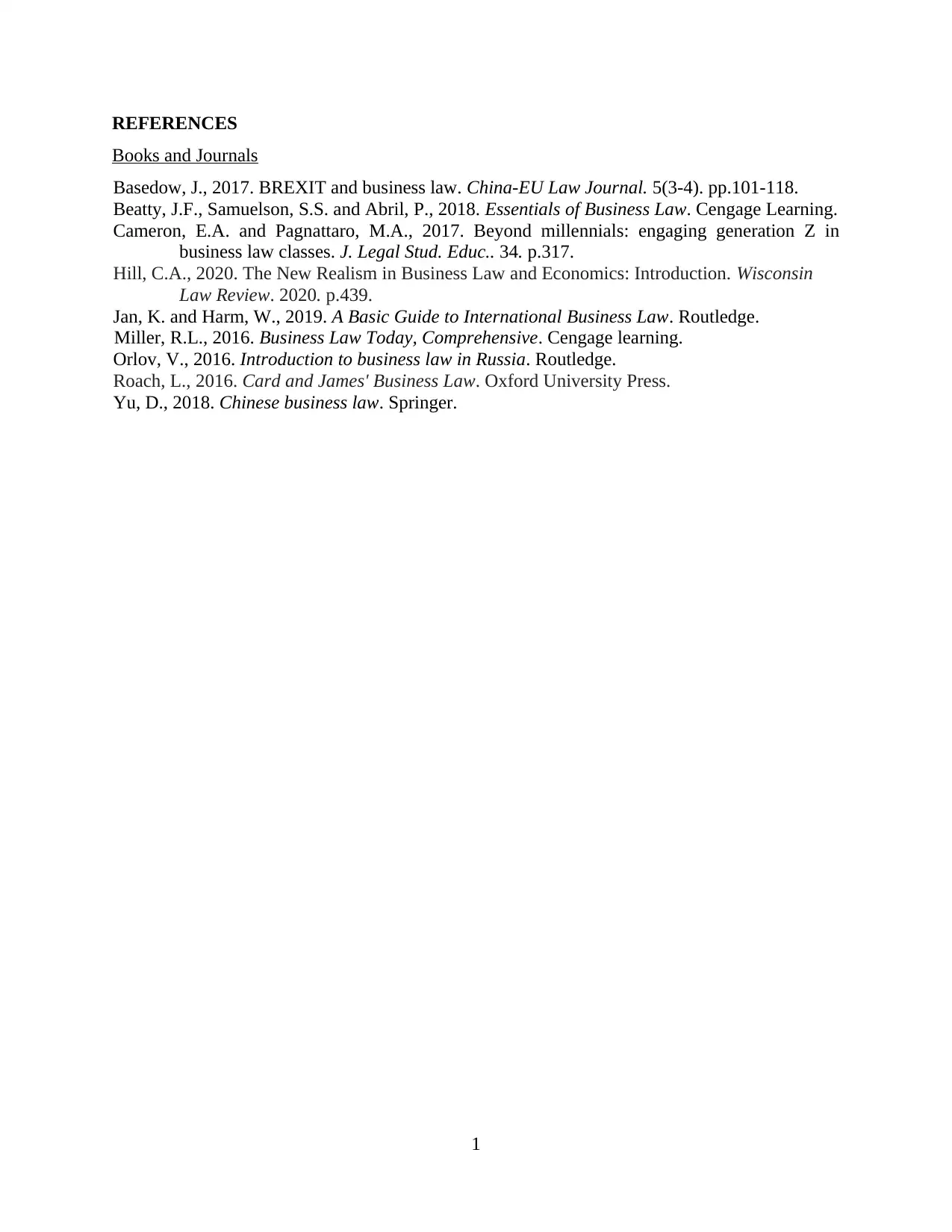
REFERENCES
Books and Journals
Basedow, J., 2017. BREXIT and business law. China-EU Law Journal. 5(3-4). pp.101-118.
Beatty, J.F., Samuelson, S.S. and Abril, P., 2018. Essentials of Business Law. Cengage Learning.
Cameron, E.A. and Pagnattaro, M.A., 2017. Beyond millennials: engaging generation Z in
business law classes. J. Legal Stud. Educ.. 34. p.317.
Hill, C.A., 2020. The New Realism in Business Law and Economics: Introduction. Wisconsin
Law Review. 2020. p.439.
Jan, K. and Harm, W., 2019. A Basic Guide to International Business Law. Routledge.
Miller, R.L., 2016. Business Law Today, Comprehensive. Cengage learning.
Orlov, V., 2016. Introduction to business law in Russia. Routledge.
Roach, L., 2016. Card and James' Business Law. Oxford University Press.
Yu, D., 2018. Chinese business law. Springer.
1
Books and Journals
Basedow, J., 2017. BREXIT and business law. China-EU Law Journal. 5(3-4). pp.101-118.
Beatty, J.F., Samuelson, S.S. and Abril, P., 2018. Essentials of Business Law. Cengage Learning.
Cameron, E.A. and Pagnattaro, M.A., 2017. Beyond millennials: engaging generation Z in
business law classes. J. Legal Stud. Educ.. 34. p.317.
Hill, C.A., 2020. The New Realism in Business Law and Economics: Introduction. Wisconsin
Law Review. 2020. p.439.
Jan, K. and Harm, W., 2019. A Basic Guide to International Business Law. Routledge.
Miller, R.L., 2016. Business Law Today, Comprehensive. Cengage learning.
Orlov, V., 2016. Introduction to business law in Russia. Routledge.
Roach, L., 2016. Card and James' Business Law. Oxford University Press.
Yu, D., 2018. Chinese business law. Springer.
1
1 out of 8
Related Documents
Your All-in-One AI-Powered Toolkit for Academic Success.
+13062052269
info@desklib.com
Available 24*7 on WhatsApp / Email
![[object Object]](/_next/static/media/star-bottom.7253800d.svg)
Unlock your academic potential
Copyright © 2020–2026 A2Z Services. All Rights Reserved. Developed and managed by ZUCOL.





